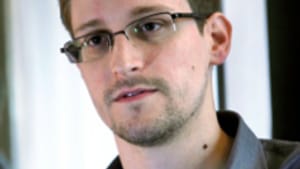Stay in the Loop
BSR publishes on a weekly schedule, with an email newsletter every Wednesday and Thursday morning. There’s no paywall, and subscribing is always free.
The man who outed the dragon
My person of the Year: Edward Snowden

It was a cinch that Pope Francis would be Time Magazine’s Person of the Year. For a publication with declining circulation, who could resist a choice that would appeal to more than a billion potential readers? The other four nominees were, obviously, throw-ins. Among them, though, was the person who, if anyone can claim to have altered history this year, would have won hands down: Edward J. Snowden, the man who blew the National Security Agency’s cover.
Snowden sits now in Moscow or thereabouts, the guest of Vladimir Putin. His revelations about the NSA’s global snooping have been a series of bombs carefully detonated under the Security State over a period of months. They have revealed, thus far, a government unto itself that, under a cloak of secrecy, has scarfed up virtually all private data stored or posted electronically, which is to say almost all the information by which the world’s business is transacted on a daily basis.
Its collection and storage capacity is virtually limitless; it ingests some 5 billion communications each day. These are subject to algorithms that supposedly attempt to sift out suspicious characters but can be put to any use its designers (or its hackers) choose. Since there has not been and perhaps cannot be meaningful oversight of such an apparatus, this means we are all fair game for anyone in a position to manipulate it— say, an Edward J. Snowden.
Terrorist’s dream
Snowden’s most important revelation is just this: Any mid-level employee among thousands who service the NSA’s machine can play Dr. No if he so chooses. Snowden didn’t do this. Instead of anonymously targeting particular victims or, say, attempting to wreak havoc with international markets, he turned his guns on the NSA itself in the belief that it constitutes a far greater threat to the world than any conceivable object of its search could be. I believe he is correct.
The NSA is not just a super-sophisticated spy machine. By reducing everyone to objects of unaccountable scrutiny, it renders our notions of freedom and privacy obsolete, and with it the very concept of a liberal society that the past several hundred years have labored to produce. What terrorist could dream of such a triumph?
Snowden might have dumped his information on us all at once. It would have been a nine-day wonder, to be buried by the next news cycle. Instead, he has shrewdly released his material at intervals, building his case carefully, teasing us into awareness, and never letting his subject off the hook. Each new cache has been more dumbfounding than the last: reading the private e-mails of allied heads of government; turning Internet search engines into tools of state; and, like some sleuth of dreams, even entering the world of fantasy games. The ultimate achievement of the state would be, indeed, to read and reshape our dreams. By infiltrating its own agents into game sites and interacting with the players, the NSA has taken a long step toward this goal.
Bring him home
There is something preposterous in all this, for the hilarious and the sinister often go side by side. Like the Martians in H. G. Wells’s The War of the Worlds, the NSA’s spy circus appears simultaneously all-powerful and supremely vulnerable. For the one objective it is putatively designed to address— stopping terrorism— it has proven quite useless. Since it lacks an articulable function, it’s capable only of mischief. Presumably it awaits an artificial intelligence capable of truly exploiting its endlessly expanding trove. Human dictators have experimented with thought control in the past century; the NSA has developed a capacity that awaits a post-human mind.
And yet . . . a lone individual has outed this dragon. Others had glimpsed its scales, but only Edward Snowden has presented the beast itself. No greater public service has been rendered in our time by any private person. We should bring him home— not for trial but for a ticker-tape parade.
There are signs at last that a reaction has set in. A Bush-appointed federal judge, Richard J. Leon, has issued a scathing opinion in a private lawsuit. A presidential commission report recommended that the collection of metadata be stopped. Legislation is slowly stirring in Congress. Leon’s ruling will be contested, and the commission report is sure to be resisted by the White House. The battle won’t be truly joined, though, until Americans reject the ideology of a war on terror on which the Security State feeds, and dismantle the apparatus that supports it. The real war we’re in is with the many-armed creature that claims to be our government.
Sign up for our newsletter
All of the week's new articles, all in one place. Sign up for the free weekly BSR newsletters, and don't miss a conversation.

 Robert Zaller
Robert Zaller